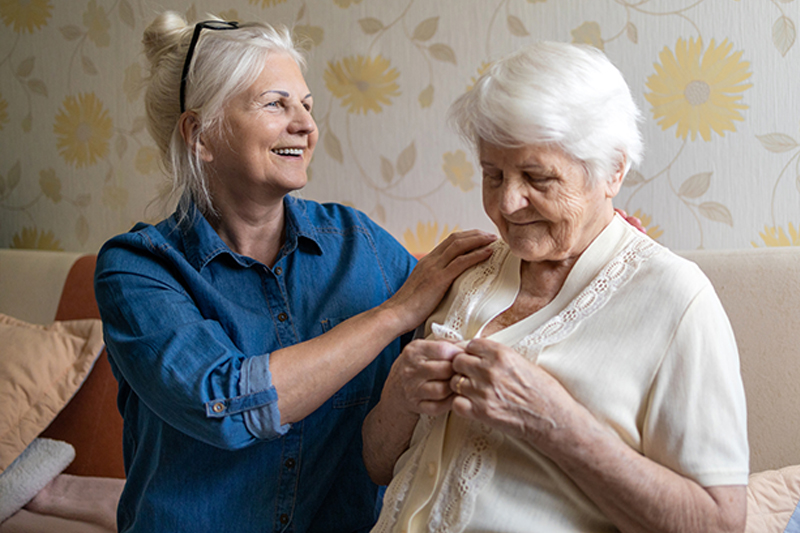
Middle stage Alzheimer’s frequently brings on behavior and communication changes.
Getting the news that an older loved one has been diagnosed with Alzheimer’s is life-changing. Thinking through the many different facets and factors associated with the disease as well as its impacts, both currently and in the future, may be overwhelming.
In this three-part series, we will examine the early, middle and later stages of dementia. We will detail the type of care required during each stage, what family caregivers can expect, and how Compassionate Nursing Services can help.
Middle Stage Alzheimer’s Caregiving
Changes in the middle stage of Alzheimer’s occur gradually, and might be unnoticeable at first. Eventually, a loved one in this stage will start to experience ever-increasing challenges with daily tasks, such as getting dressed. It is vital for family caregivers to continue to encourage a feeling of independence, allowing the senior loved one to accomplish these tasks at his or her own pace for as long as possible (and as long as it is safe to do so). This involves flexibility, patience, and adaptability.
It will become essential to devote more time to providing care, and to develop innovative techniques and approaches to lessen frustration – for the older adult and for yourself as his or her caregiver. Self-care becomes very important in the middle stage of dementia in order to help caregivers manage stress.
Here’s what you may expect to experience during this stage:
Behavior Changes
- Anxiety
- Impatience
- Depression
- Repetitive behaviors
- Aggressive outbursts (physical and/or verbal)
Ways You Can Help
Projecting a relaxed demeanor is important. Never argue or try to reason with a loved one in the middle stage of dementia. In a calm and soothing tone, recognize the feeling behind the behavior and offer recommendations that can help. As an example: “Grandma, I can see you’re feeling angry about misplacing your favorite shirt. It is probably in the washing machine. This green one looks pretty on you; would you like to wear it today?”
Understand that the words and actions being conveyed are not a reflection of you personally, but merely part of the common progression of dementia. Frequently, there is an underlying emotion, such as fear, exhaustion, or hunger, driving the behavior. Make an effort to figure out the main cause and address that.
Communication Changes
- Losing train of thought
- Forgetting a word
- Repeating questions or statements
- The use of more non-verbal communication
Ways You Can Help
Accept whatever form of communication is most effective for the older adult, without trying to correct him or her. Alter your communication technique to make it easier for the older adult to understand and respond to you. For instance, instead of asking open-ended questions (“What would you like for dinner today?”) offer a choice between just two options (“Would you like chicken or fish for dinner today?”). Speak in a clear, gentle tone, and give your loved one sufficient time to reply without jumping in and providing the answer yourself.
Safety-Related Changes
- Wandering
- Driving concerns
- Sundowning
In this stage of the disease, paying closer attention to safety issues becomes crucial. Driving should stop – something that’s typically hard for seniors to accept. If possible, include the older adult in making this decision. If not, a note from the doctor prohibiting driving is often the best way to gain his or her consent. In the event the senior is adamant about continuing to drive, you might need to hide the keys, or replace his / her set of keys with nonworking ones.
Likewise, wandering and sundowning become concerning and challenging for family caregivers to manage independently. Partnering with an established and trusted care provider with experience in dementia care, like Compassionate Nursing Services, is a perfect solution. Our caregivers in St. Louis. MO and the surrounding areas can take the night shift, making sure that seniors are safe and distracted with interesting activities when not able to sleep – enabling family caregivers to get the rest they need.
For more information on our specialized in-home dementia care and how our dementia care Creve Coeur, MO, services can help a senior you love with in home care needs, reach out to us at 314-432-4312 to set up a free in-home consultation. To learn more about each of the communities where we provide care, please visit our Service Area page.
